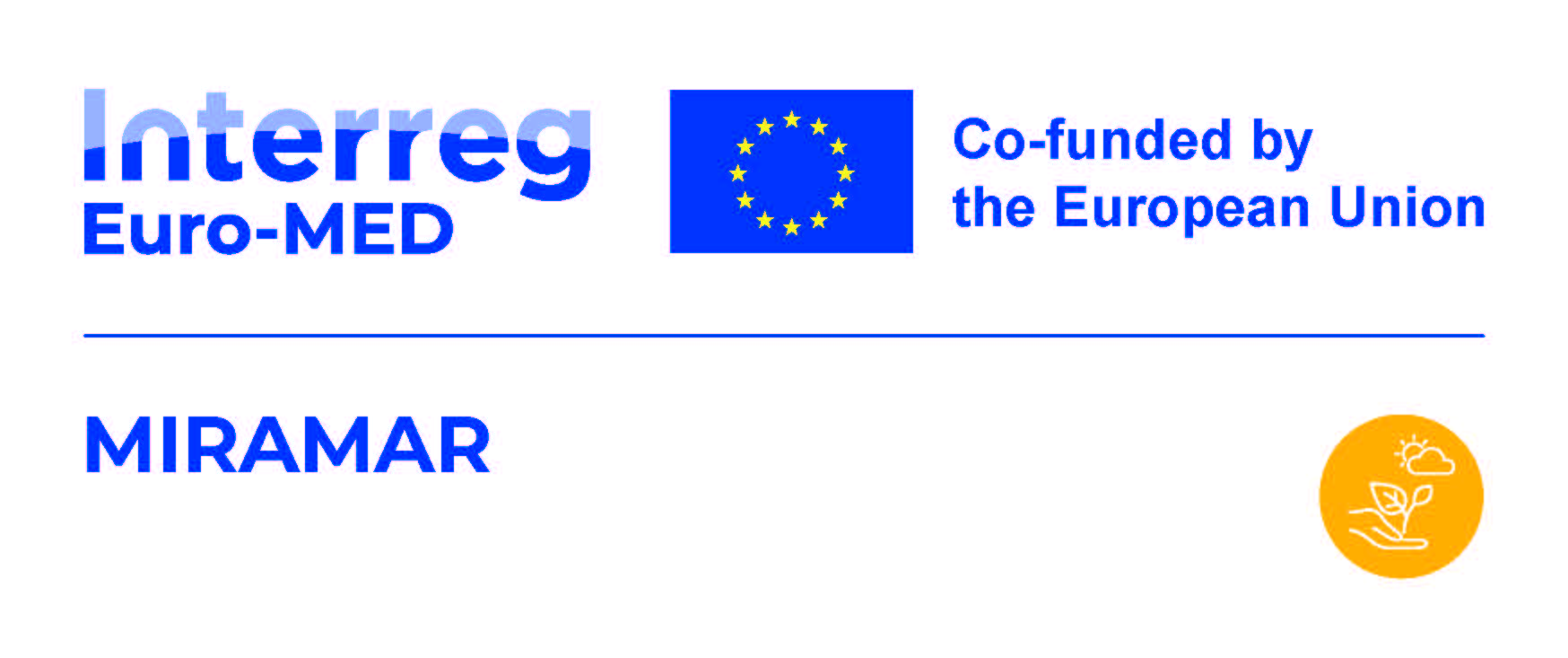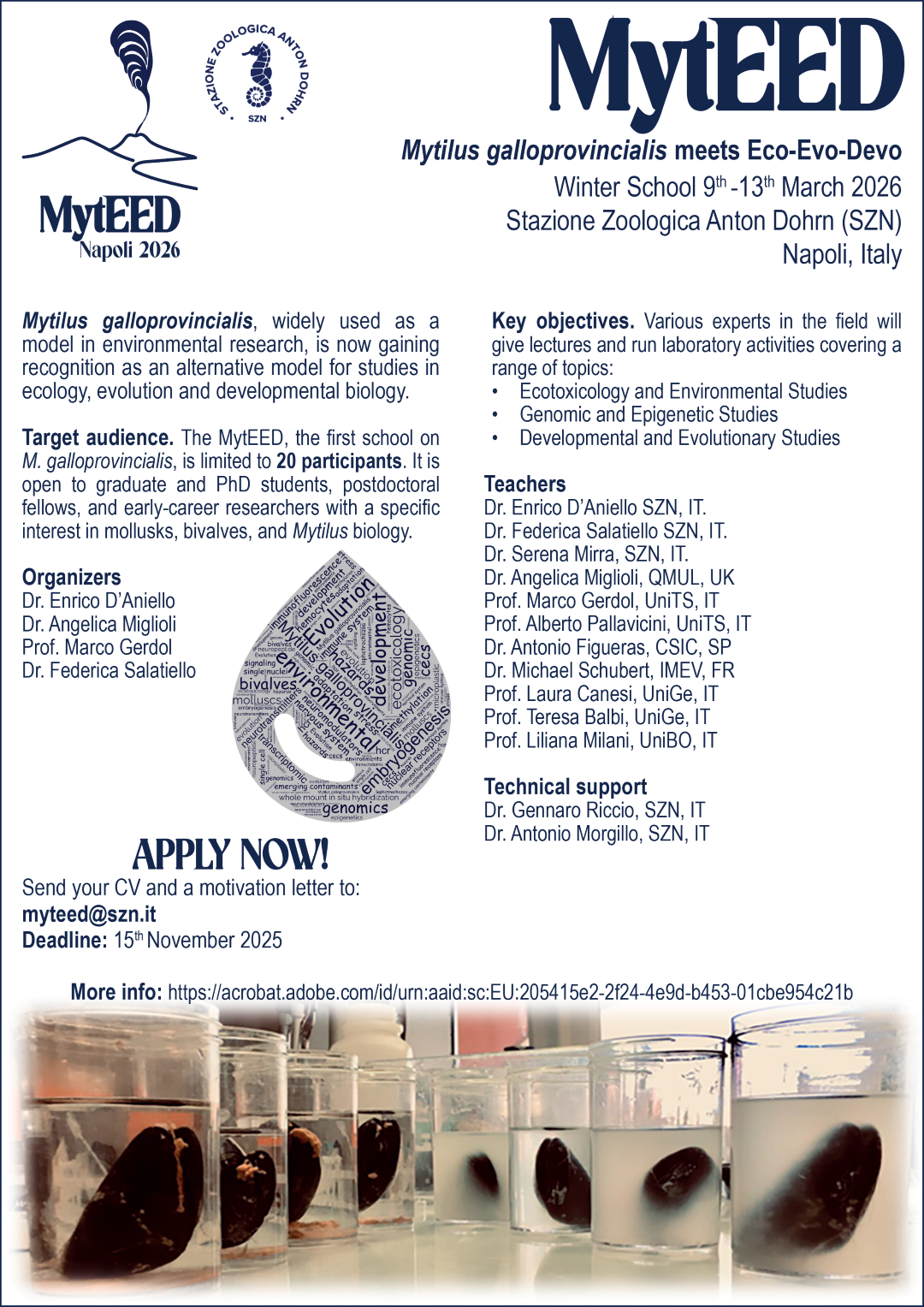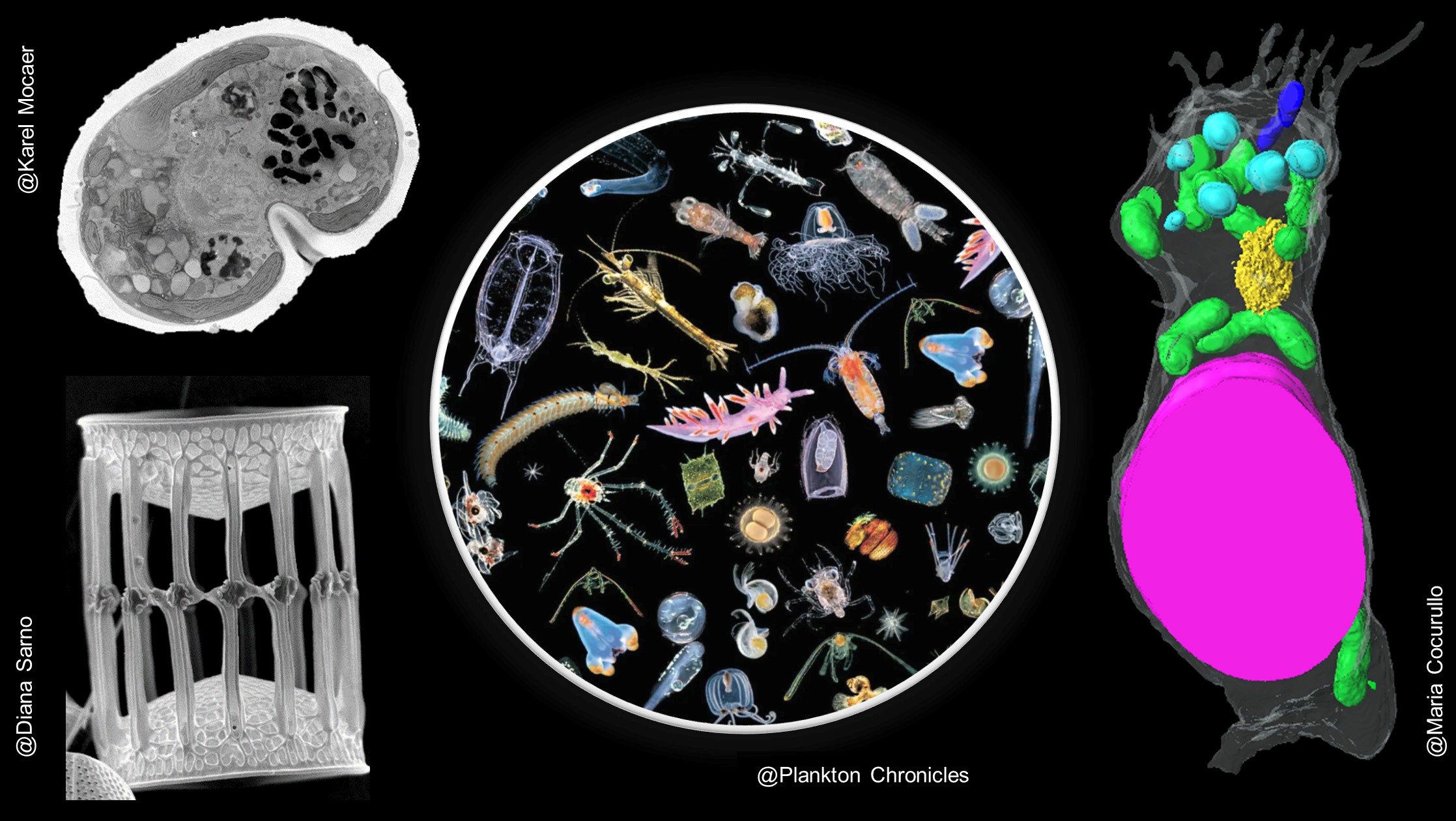
Funding instrument: Interreg Euro-MED
Mission: Natural Heritage
Specific objective: Enhancing protection and preservation of nature, biodiversity and green infrastructure, including in urban areas, and reducing all forms of pollution
Project duration: 33 months (April 2025 – December 2027)
Project budget: € 2.500.000
The biodiversity of the Mediterranean Sea is under increasing threat from legacy and emerging contaminants, marine litter, noise and light pollution, invasive species and habitat destruction -all of which are driven by growing human activity and intensified by climate change.
In response to this challenge, MIRAMAR is bringing together fragmented knowledge to develop an integrated, cross-border approach to managing multiple environmental stressors. The project aims to generate robust, evidence-based insights to support long-term ecological stability and shared Mediterranean priorities.
Launched in April 2025, the 33-month project will design, test, and validate a new holistic monitoring method to identify suitable nature-based mitigation and restoration solutions.
GOAL
The aim of the MIRAMAR project is to develop a joint approach to improve our understanding of, and response to, the combined effects of different environmental pressures on three vital ecosystems in the Euro-Mediterranean region: seagrass meadows, wetlands and habitats of endangered species.
MIRAMAR will design, test, and validate a new holistic monitoring method to identify suitable nature-based mitigation and restoration solutions. By aligning with regional and national monitoring strategies, as well as the management plans of protected areas, MIRAMAR will tackle the shared challenge of preventing, mitigating and restoring environmental degradation across these vital ecosystems.
ACTIVITIES
Working across nine pilot areas in six Mediterranean countries — Albania, Croatia, France, Greece, Italy and Spain — MIRAMAR will:
- monitor how multiple stressors affect vulnerable ecosystems
- test harmonised, innovative methods for data collection and analysis
- co-develop nature-based solutions for mitigation and restoration
- align actions with key European, Mediterranean and EuroMediterranean environmental policy frameworks
EXPECTED RESULTS
MIRAMAR will produce a set of concrete, high-value deliverables aimed at supporting environmental monitoring, management and policy action across the Mediterranean:
- Harmonised strategies to monitor the cumulative impact of multiple stressors in degraded ecosystems
- Toolkits for assessing combined effects of pollution, invasive species and habitat degradation
- Assessment on the cumulative impact of multiple stressors in the nine pilot areas
- Good Practices, developed through Living Labs, illustrating successful examples of restoration and mitigation
- Training on monitoring cumulative impact and identifying pollution mitigation and restoration solutions
The overall experience and lessons learned from MIRAMAR will be translated into strategic results, designed for long-term use and replication:
- Harmonised monitoring protocols
- Operational roadmaps for ecosystem mitigation and restoration
- Evidence-based tools and guidelines to support environmental governance
- Cross-sectoral engagement models (e.g. Living Labs, stakeholder co-creation)
- Policy-aligned frameworks to guide decision-makers in the Mediterranean region
PARTNERSHIP
- University of Siena (UNISI) – Italy
- Mediterranean Information Office for Environment, Culture and Sustainable Development (MIO-ECSDE) – Greece
- Spanish National Research Council (IEO-CSIC) – Spain
- Hellenic Centre for Marine Research (HCMR) – Greece
- Stazione Zoologica Anton Dohrn – Italy
- Ministry of Tourism and Environment of Albania – Albania
- Ruđer Bošković Institute – Croatia
- Corsican Environment Office (Office de l’Environnement de la Corse) – France

ACRONIMO: NBFC
RIFERIMENTI BANDO: Avviso n. 3138 del 16/12/2021 “Proposte di intervento per il Potenziamento di strutture di ricerca e creazione di “campioni nazionali” di R&S su alcune Key Enabling Technologies da finanziare nell’ambito del Piano Nazionale di Ripresa e Resilienza”, Missione 4 Componente 2 Investimento 1.4 “Potenziamento strutture di ricerca e creazione di "campioni nazionali di R&S" su alcune Key Enabling Technologies” finanziato dall’Unione europea – NextGenerationEU.
CUP: C63C22000520001
CODICE PROGETTO: CN00000033
DURATA: 40 MESI (01.09.2022 -31.12.2025)
Coordinatore:HUB NBFC
Il National Biodiversity Future Center (NBFC) è il primo Centro Nazionale di ricerca e innovazione dedicato alla biodiversità, finanziato dal MUR attraverso i fondi dell'Unione Europea - NextGenerationEU. Si tratta di una struttura di coordinamento che da un lato raccoglie e valorizza gli sforzi della ricerca, dall'altro rende accessibili le conoscenze e le tecnologie a diversi attori che operano sul territorio ed è organizzato in una struttura di HUB e SPOKE dedicati a MARE, TERRA, AREE UMIDE, CITTA e due trasversali dedicati alla formazione, comunicazione, condivisione della conoscenza, e all'innovazione e alle politiche anche grazie a connessioni internazionali.
La biodiversità svolge un ruolo cruciale nel funzionamento di tutti gli ecosistemi del nostro Pianeta e la conseguente fornitura di beni e servizi ecosistemici. Questi ultimi supportano il benessere delle società umane e del singolo individuo. L’incremento della crescita della popolazione umana, raddoppiata solo negli ultimi 50 anni, e le legittime aspirazioni per livelli sempre maggiori di standard di qualità di vita, hanno determinato ad una pressione costante e crescente sulla biodiversità, che si è tradotta in sovra-sfruttamento degli ecosistemi, alterazione climatica globale e estinzione delle specie. Per contrastare lo stato “di fatto” emergenziale attuale e per riportare l’azione dell’uomo ad un livello di sostenibilità, è necessario intervenire con strumenti appropriati, basati su solide conoscenze scientifiche e tecnologiche, e capaci di ottemperare alle disposizioni europee previste per il 2030: ridurre la perdita di biodiversità del 30% e recuperare almeno il 15% gli equilibri ecosistemici per mezzo di azioni di ripristino ecologico degli habitat. Vi è quindi la necessità di agire velocemente sui diversi livelli di organizzazione biologica che comprendono i processi, le funzioni e le interazioni essenziali tra gli organismi e il loro ambiente.
In questa idea moderna di biodiversità funzionale gli esseri umani devono essere componente integrate e non preponderante degli ecosistemi. Il PNRR offre una grande opportunità per rendere concreta questa visione in un Paese come l’Italia che è parte dell’Hot Spot di biodiversità del Mediterraneo data la ricchezza in specie endemiche e la grande variabilità ecologica e di habitat. Nonostante questa ricchezza, il nostro Paese ha subito consistenti perdite e fenomeni di erosione della biodiversità nei confronti di numerosi taxa (45% delle specie animali e quasi il 55% delle specie vegetali sono a rischio di estinzione) e habitat (circa il 30%), soprattutto a causa di fattori antropici e ambientali connessi.
L’elevato tasso di estinzione di specie, abbinato alla perdita e frammentazione di ambienti critici, come la macchia mediterranea in ambito terrestre e le praterie di fanerogame in ambito marino, sono fenomeni irrecuperabili e hanno un impatto devastante anche sulle risorse naturali e i cicli degli elementi. Questi fattori minano l’efficacia dei servizi ecosistemici fondamentali per la resilienza degli ecosistemi e per il benessere dell’uomo.
Il Progetto si divide in Spoke e Linee di attività;
La SZN è coinvolta nei seguenti Spoke/Linee di attività:
Spoke 1 - “Mapping and monitoring actions to preserve marine ecosystem biodiversity and functioning” - Responsabile: Simonetta Fraschetti-Gianluca Sarà
1. Linea 1 - “Observatory reference database of genetic/molecular biological, ecological and taxonomic data”
Referente interno SZN Spoke 1 Linea 1: Priscilla Licandro
2. Linea 2 - “Biodiversity resilience and ecosystem functioning”
Referente interno SZN Spoke 1 Linea 2: Maria Cristina Mangano
3. Linea 3 - “Innovative strategies to conserve marine biodiversity and achieve EU targets”
Referente interno SZN Spoke 1 Linea 3: Paolo Guidetti
Spoke 2 - “Solutions to reverse marine biodiversity loss and manage marine resources sustainably” – Responsabile: Mariachiara Cantore-Gianmarco Luna
1. Linea 1 - “Recognizing the value of biodiversity and ecosystem health toward a more sustainable fishery”
Referente interno SZN Spoke 2 Linea 1: Giacomo Melisenda
2. Linea 2 - “Restore biodiversity and ecosystems”
Referente interno SZN Spoke 2 Linea 2: Simonepietro Canese
3. Linea 3 - “Sustainable valorization of marine resources”
Referente interno SZN Spoke 2 Linea 3: Donatella De Pascale
4. Linea 5 – “Develop innovative Multi-Omics based technologies to address emergent biodiversity threats”
Referente interno SZN Spoke 2 Linea 5: Diana Sarno
Spoke 7 – “Biodiversity and society: communication, education and social impact” -
Responsabile: Isabella Saggio - Luigi Bubacco
Referente interno SZN Spoke 7: Claudia Gili
1. Linea 1 - “Science communication and public engagement in biodiversity topics: new languages and formats”
2. Linea 2 - “Outreach: young people, schools, Universities”
3. Linea 6 - “Enhancement: global health”
4. Linea 7 - “Enhancement: Italian naturalistic museums and observatory”
5. Linea 4 - “Enhancement: the public administration”
6. Linea 5 - “Enhancement: the industrial and economic world”
7. Linea 8 - “Euro-Mediterranean Observatory on Biodiversity”
RESPONSABILE SCIENTIFICO SZN DEL PROGETTO : Teresa Romeo
RESPONSABILE AMMINISTRATIVO: Giorgio Carpino
Partner: CENTRO NAZIONALE DELLE RICERCHE, UNIVERSITÀ DEGLI STUDI DI PALERMO, STAZIONE ZOOLOGICA ANTON DOHRN, ISTITUTO NAZIONALE DI OCEANOGRAFIA E DI GEOFISICA SPERIMENTALE, POLITECNICO DI MILANO, UNIVERSITÀ DEGLI STUDI DEL MOLISE, UNIVERSITÀ DEGLI STUDI DELLA TUSCIA, UNIVERSITÀ DEGLI STUDI DI FIRENZE, UNIVERSITÀ DEGLI STUDI DI MILANO-BICOCCA , UNIVERSITÀ DEGLI STUDI DI MODENA E REGGIO EMILIA, UNIVERSITÀ DEGLI STUDI DI NAPOLI FEDERICO II, UNIVERSITÀ DEGLI STUDI DI PAVIA, UNIVERSITÀ DEGLI STUDI DI ROMA LA SAPIENZA, UNIVERSITÀ DEGLI STUDI DI SASSARI, UNIVERSITÀ DEGLI STUDI DI SALERNO, UNIVERSITÀ DEGLI STUDI DI SIENA, UNIVERSITÀ DEGLI STUDI DI UDINE, UNIVERSITÀ DEGLI STUDI DI VERONA, UNIVERSITÀ DEGLI STUDI ROMA TRE, UNIVERSITÀ DEL SALENTO, UNIVERSITÀ DI BOLOGNA, UNIVERSITÀ DI GENOVA, UNIVERSITÀ DI PADOVA, UNIVERSITÀ POLITECNICA DELLE MARCHE, UNIVERSITÀ DI TORINO, ABOCA SPA SOCIETÀ AGRICOLA, CINECA, CMCC - CENTRO EURO-MEDITERRANEO SUI CAMBIAMENTI CLIMATICI, CORILA, CREA CONSIGLIO PER LA RICERCA IN AGRICOLTURA E L'ANALISI DELL'ECONOMIA AGRARIA, DOMPÉ FARMACEUTICI, ENEA, ENEL, ERSAF - ENTE DI RICERCA SCIENTIFICA ED ALTA FORMAZIONE, FONDAZIONE CIMA - CENTRO INTERNAZIONALE IN MONITORAGGIO AMBIENTALE, FONDAZIONE EDMUND MACH DI SAN MICHELE ALL'ADIGE, FONDAZIONE IMC CENTRO MARINO INTERNAZIONALE ONLUS, FONDAZIONE RI.MED, FS SISTEMI URBANI, HUMANITAS UNIVERSITY, INFRASTRUTTURE SPA, INNOMED SRL, ISTITUTO ITALIANO DI TECNOLOGIA, ISTITUTO SUPERIORE PER LA PROTEZIONE E LA RICERCA AMBIENTALE, NOVAMONT SPA, UNIVERSITÀ CAMPUS BIO-MEDICO DI ROMA, SCUOLA SUPERIORE DI STUDI UNIVERSITARI E DI PERFEZIONAMENTO SANT'ANNA, UNIVERSITÀ CATTOLICA DEL SACRO CUORE, INFN, ENI
About the Winter School. Understanding how global changes affect marine biodiversity requires powerful model systems. The Mediterranean mussel Mytilus galloprovincialis has long been a key species in environmental research and is now gaining increasing relevance in evolutionary and developmental biology. Recent advances in genomic and technological resources have made M. galloprovincialis a unique model to study biological processes with unprecedented precision in marine biology, bridging ecological (ECO), evolutionary (EVO) and developmental (DEVO) perspectives. The MytEED Winter School aims to bring together researchers working on M. galloprovincialis to share expertise, harmonize methodologies, and foster interdisciplinary collaborations.
Objectives & Topics. MytEED aims to provide in-depth training on M. galloprovincialis as a model organism, highlight ECO-EVO-DEVO approaches in marine biology, strengthen interdisciplinary exchange and collaboration, and discuss the impact of global climate change on marine biodiversity.
Program Overview
Day 1. Welcome, Registration & Poster Session
Day 2. Development, Ecology & Toxicology
Day 3. Epigenetics, Nervous System & Bioinformatics
Day 4. Immunology, Aquaculture & Single-cell
Day 5. Genomics & Concluding remarks. Aquarium and Darwin-Dohrn Museum visit, Social Dinner.
(Detailed program will be provided upon registration)
Practical Information
Location. Stazione Zoologica Anton Dohrn, Via Francesco Caracciolo, 80122 Napoli (NA), Italy
Accommodation: A list of suggested hotels and guesthouses will be provided.
Meals: Lunch and coffee breaks are included in the registration fee.
Fees & Registration. The participation fee is €300 per person. The fee includes lectures, course material, coffee breaks, lunches, and social events. Accommodation and travel are not included.


The Electron Microscopy Hands-On Course: sample preparation and imaging of marine environmental samples arises from a very strong and active collaboration between the Stazione Zoologica Anton Dohrn and the EMBL in Heidelberg.
The aim of the course is to provide a theoretical and practical training on electron microscopy starting from the basics to the preparation of samples with high pressure freezing and image acquisition using TEM and SEM.
The course will also include lectures on advanced and recently developed technologies as volume electron microscopy and correlative light-electron microscopy.
The course will take place at the Stazione Zoologica Anton Dohrn in Naples from 8 to 11 April 2026. It is primarily aimed at researchers and technicians from scientific institutions with an interest in electron microscopy. Prior documented experience in electron microscopy is not required.
Theoretical lessons
Sample preparation for EM – Chemical fixations
Sample preparation for EM - High pressure Freezing- Freeze substitution
Image formation in TEM and SEM
Sectioning difficult marine organisms
Immunolabeling
Correlative Light Electron Microscopy
Volume Electron Microscopy
Case studies (lectures by Fellows from ZooCELL Doctoral Network)
Practical lessons
Sample preparation: from the sea to the tube
Sample preparation for SEM
Ultramicrotomy
High pressure freezing
Image acquisition at TEM
Image acquisition at SEM
Teachers
Giovanna Benvenuto, SZN, Napoli
Christel Genoud, University of Lousanne
Alexandra Kerbl, COS Heidelberg
Frédéric Leroux, Diatome Ltd
Karel Mocaer, COS Heidelberg
Viola Oorschot, EMBL, Heidelberg
Seetharaman Parashuraman, CNR, Napoli
Paolo Ronchi, EMBL, Heidelberg
Fellows from ZooCELL Doctoral Network
Keynote lecturer
Detlev Arendt, EMBL, Heidelberg (title TBD)
Teaching assistants
Franco Iamunno, Rita Graziano, Lorenza Rusciano, Filomena Caccavale
IMPORTANT INFORMATION
Application deadline February, 12th
Prior to application it is mandatory to send a Curriculum vitae to This email address is being protected from spambots. You need JavaScript enabled to view it.
Accepted participants will be notified by February, 20th
Registration and payment are due by March, 2nd
Fee: 300 euro per person (coffee breaks, lunches, and social dinner included)
The course will be open to 16 participants. Preference will be given to strongly motivated applicants.
ORGANIZERS:
Giovanna Benvenuto, Paolo Ronchi, Alexandra Kerbl, Karel Mocaer and Ina Arnone
Contact: This email address is being protected from spambots. You need JavaScript enabled to view it.
Follow us: @em-hoc.bsky.social
![]()
Join the First Edition of the International Summer School in Bioremediation of Aquatic Environments (SSBIOREM1) which will be held at Stazione Zoologica Anton Dohrn of Naples!
Are you a graduate student, PhD candidate or early-career researcher passionate about aquatic ecosystems and sustainable solutions to decontaminate polluted ecosystems?
The International Summer School in Bioremediation of Aquatic Environments, is an intensive four-day experience blending cutting-edge science, practical training, and rich cultural immersion in one of Italy’s most iconic scientific institutions.
Taking place from 7–10 October 2025 at the Department of Ecosustanaible Marine Biotechnology (BLUBIO) sited at the Molosiglio seat (Via Acton, 55) in Naples, this school offers an unparalleled opportunity to learn directly from leading experts in environmental science, microbiology, and biotechnology. The four days of summer school will be focused on current interdisciplinary approaches used in the bioremediation field, focusing on the exploitation of microbes to remove or neutralize pollutants from contaminated sites. It can be considered a promising alternative to conventional chemical methods, which usually foresee high investment costs and do not exclude the formation of toxic byproducts.
The Summer School program organized by researchers and technologists of the Ecosustainable Marine Biotechnology Department of the SZN will enhance current knowledge in bioremediation techniques, contribute to habitat restoration efforts, and highlight the need for innovative, environmentally friendly solutions. Lectures, short communications, and practical afternoon sessions will create a stimulating environment for participants and give them skills and tools on the most updated methodologies in the remediation field.
What You’ll Learn
Bioremediation – the use of living organisms to clean up pollutants from the environment – is one of the most promising solutions to aquatic contamination. This summer school provides a comprehensive overview of the theory, techniques, and current innovations in this rapidly growing field.
Each day focuses on a key theme:
• Day 1: Impact of Pollutants and Introduction to Bioremediation – Begin with a welcome from the BLUBIO Department, followed by engaging lectures on the impacts of pollutants on human health, and the foundational roles of bacteria and microalgae in bioremediation. A hands-on lab will guide you through isolating microalgae and fungi suitable for cleaning aquatic environments.
• Day 2: Bioremediation Strategies using Microorganisms – Dive deeper into the microbial players involved in pollutant degradation, including bacteria, fungi, and algae. Learn how communities of these organisms interact in real-world remediation scenarios. In the afternoon, you’ll construct your own bioremediation microcosm, simulating contamination treatment on a small scale.
• Day 3: Innovative Approaches – Explore novel technologies like MICP (microbially induced calcite precipitation), plastic degradation using microbial enzymes, and bioleaching. Evaluate microcosm performance in the lab while discovering next-generation strategies for environmental restoration.
• Day 4: Case Studies & Success Stories – Wrap up with lectures on real-world bioremediation projects, such as the LIFE SEDREMED initiative, and discuss how lifecycle analysis and biological treatments are reshaping environmental policy and practice. The school concludes with awards for the best student presentations and posters.
Practical Learning
Beyond theoretical knowledge, this summer school is designed to equip you with hands-on experience. Daily lab sessions give you the chance to apply what you've learned, guided by leading researchers in bioremediation. You’ll practice key techniques, from microbial isolation to experimental setup and evaluation of bioremediation performance.
Meet Experts and Build Your Network
You’ll learn from renowned scientist expert in the field. Here the list of speakers that will give a lecture whose expertise covers medical ecology, molecular microbiology, and environmental chemistry and biotechnology:
The summer school also includes student presentation sessions, offering a unique platform to share your own research and receive feedback from experienced mentors and peers.
Cultural & Social Program in Beautiful Naples
When you’re not in the lab or lecture hall, enjoy the vibrant life and history of Naples! Optional evening activities include a visit to the Bagnoli-Coroglio SIN (Sites of National Interest) in the Gulf of Pozzuoli, the stunning Castel dell’Ovo, and social dinner and aperitifs – all designed to foster networking and relaxation.
Why Attend?
• Learn the science behind one of the most critical environmental challenges of our time
• Gain hands-on training in laboratory techniques
• Network with top researchers and fellow participants from across disciplines
• Discover Naples, one of Italy’s cultural treasures
Register now and secure your spot at the International Summer School in Bioremediation of Aquatic Environments! Write an email to This email address is being protected from spambots. You need JavaScript enabled to view it.
Download the registration form at “link”
Registration fee (coffee and lunch breaks)
In-person: 330 €
Remote: 100 €
Number of participants: min. 20 (in-person), max. 2-3 (remote)
Deadline: 8th september, 2025












